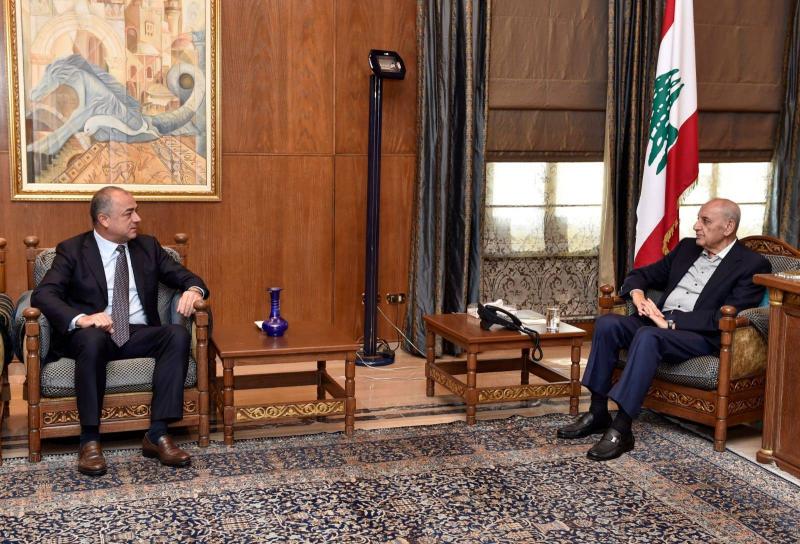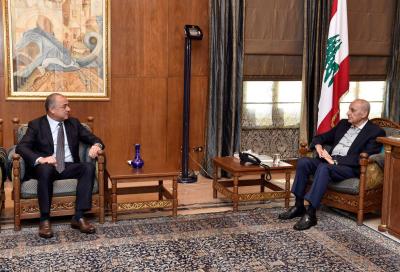The Speaker of the House, Nabih Berri, discussed political developments and legislative matters with Deputy Speaker Elias Bou Saab.
Following the meeting, Bou Saab stated: "The visit to President Berri served multiple purposes. Firstly, the anniversary of Imam Sadr's disappearance was not absent from the meeting, and President Berri's words during the anniversary were also part of the discussion, as well as the visit of Amos Hochstein. The important matter is the initiative launched by President Berri yesterday, which is a reiteration of his long-standing call for dialogue. During my recent visits to several parties and parliamentary blocs, about 90% supported dialogue that leads to results."
He added: "Today, this call frankly came to propose a dialogue for a period of 7 days, after which we can say we will go to open and repeated sessions, which is what the majority of opposing deputies demanded, asking why the sessions should not remain ongoing. If this session takes place in the council, and we know in advance that at the end of the 7 days we will head into open sessions to elect a president, it means there is hope for September to have a president."
Bou Saab continued, "Some have begun to show positive signals towards this initiative, seeing it as meeting the demand that leads to the election of a president in September. Some colleagues, and perhaps not officially from the main blocs, criticize the initiative. My question for them is what is the alternative? Whoever has an alternative solution for mutual understanding to elect a president should present it so we can discuss it with President Berri and say there is an alternative to dialogue and understanding."
He remarked, "In my opinion, this is a positive initiative and may be the last opportunity for the parliament to elect a president in 2023. If we cannot agree, no one can predict how long the vacuum will last. Those who believe they can secure 65 votes and impose a president on the other team with 65 votes, I want to ask them: if we secure 65 votes for a president and they are elected, can they form a government? Can they continue with the rescue process? There is no way but for us to discuss and reach a settlement to achieve this entitlement."
Regarding the positions of parliamentary blocs, Bou Saab mentioned: "Some deputies and a large number of independent deputies have been contacted between yesterday and today. I can say they are enthusiastic about this step and see it as meeting the demand they have been calling for all along."
He noted that President Berri has already provided the outcome, stating: "Whatever the result of the dialogue, we will go to open sessions that lead to the election of a president in September. I hope that those who have not made their final decision will consider giving a week and if they think this week is a concession, let it be a concession for the sake of Lebanon. One week of dialogue could lead to the election of a president, and if they oppose the dialogue lasting 7 days, it means they will bear significant responsibility if the country experiences a vacuum for a year or two or three. From here I said if this council cannot elect a president, let us all resign and go for early elections."
Bou Saab concluded: "The solution or the last opportunity given today to elect a president in September or this year is good. I hope everyone reconsiders their positions," noting that the position of the "Strong Lebanon" bloc and the "Free Patriotic Movement" is positive.




